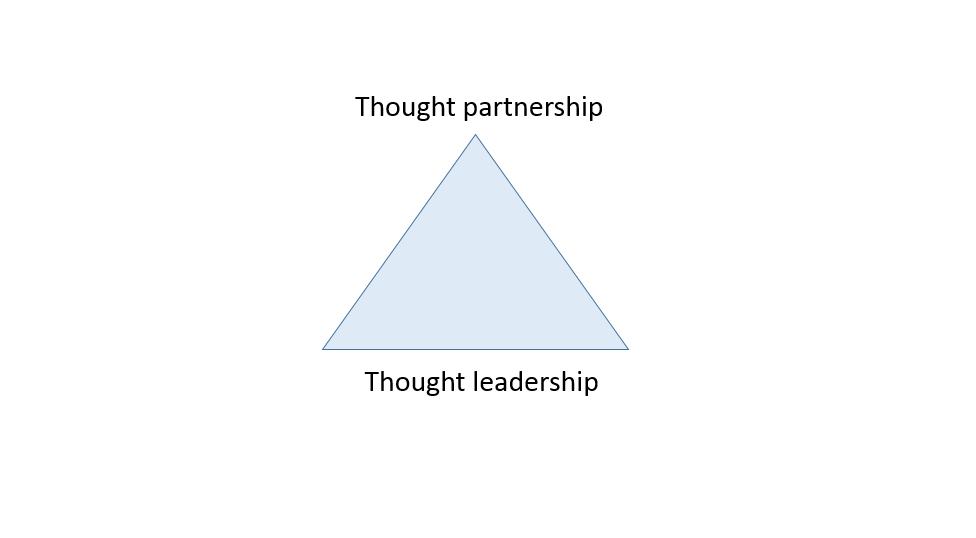Trappe Digital LLC may earn commissions from sponsored links and content. When you click and buy you also support us.
So many out there want to be experts, gurus or thought leaders. Some of the thought leaders out there are even worth following and listening to. They have good ideas. Some are entertaining. And some have no clue what they are talking about. I personally follow thought leaders and see the value in people branding themselves as one! Usually, I would recommend to make sure other people see you as a thought leader before you start using that term yourself.
We certainly need leaders, innovators and those who come up with the stuff that changes our lives for the better. Yes, that should be the goal for all innovation. To make things better! (And that leads to business success for the innovators!) We also need people who can implement those ideas.
[Tweet “”The implementers need to work with the visionaries to make it all work,” – @ctrappe”]
The next level of engagement from thought leadership likely might be thought partnership.
I heard this term used by somebody in passing the other day and I’m not the first person to ever mention it online. (Is that ever possible anyway?) But there is potential for really powerful collaboration and innovation here. So let’s explore it further. We might even be able to live and share better authentic stories if we engage in meaningful thought partnerships.
Recommended reading:
Be aware of the experts who can’t do any of the things they talk about
Here’s what thought partnership means to me:
A thought partner is somebody who brings their unique expertise and knowledge to a mostly ongoing relationship. They offer their opinions to ongoing discussions and try to improve the thinking – and with that, later the implementation. Sometimes, they offer a conflicting opinion from everyone else involved.
But, wait, isn’t that like “playing devil’s advocate?” Sometimes, yes. But not all opinions need to be dissenting from the other party or parties in the relationship. Sometimes the thought partner agrees. Sometimes they add to the other opinion or belief. Sometimes they may disagree. But a thought partnership is mostly a positive experience. The job of a thought partner isn’t to poke holes into people’s ideas, theories and plans. Their job is to make them better by adding to them through their knowledge.
Recommended reading:
 In a nutshell:
In a nutshell:
Thought leaders share their knowledge wide and far, often through blogs, books, and other such public things. Some of them respond to their community member questions. Some don’t. Some of them are more publishers than engagers, though some are quite good engaging with their audiences. The problem with engagement for big time thoughts leaders is that the bigger an audience gets the more replies they’ll get. At some point, there’s only so much time in the day to respond to them all.
Thought partners are engaged in a deeper, more personal, often 1-on-1 setting with another business leader. They share ideas and improve their client’s ideas. Yes, to get a thought leader to become your thought partner and give you customized advice you’ll likely have to pay them.
[Tweet “Blog posts are usually free to read. Customized advice is not. There’s a fee.”]
Conclusion: When to hire a thought partner!
Hiring the right thought partners can help businesses, leaders and others make better decisions. The trick is to find the right thought leaders and actual experts who will offer a valuable thought partnership. Mentorship is one version of thought partnership, though it’s one that’s usually free of charge to the person being mentored.
A couple of points when a thought partner might be needed:
- When organizations face issues that nobody inside the organization can currently fix
- When organizations need an outside perspective
But, do all thought partners need to be outsiders (aka consultants?)
Absolutely not. People inside an organization also can be thought partners to each other. I’ve been in organizations where that has been the case, but the trick for that to work is that people need to be allowed to actually voice their expertise and opinion. Thought partnerships between people especially in the same organization only work when people are allowed to be more than “Yes people.” They need to be allowed to offer their thoughts.
Building thought partnerships will become more and more important in this ever-changing environment. It’s virtually impossible for one person (you know, the one with the fanciest title) to have all the answers. That’s why we need thought partners. More importantly we need thought partners who actually are thought leaders and know what they are talking about.

